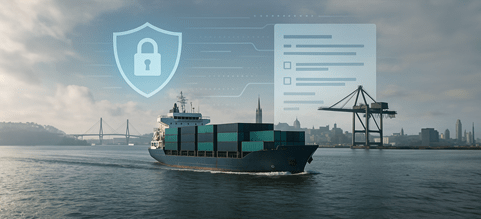Implementation of the Import Control System 2 (ICS2) for sea freight import shipments to Europe
As of 1 April 2025, new and stricter customs security regulations will apply within the European Union. These regulations fall under the Import Control System 2 (ICS2), a new EU programme for the advance screening of import shipments. The new requirements apply to all sea freight destined for EU countries or transiting through them, including Northern Ireland, Norway and Switzerland.

ICS2 functions as a security screening system for freight. By submitting information about your cargo in advance, EU customs authorities can assess potential risks before the shipment arrives. This enhances safety and helps prevent delays during clearance. When shipping goods to the EU, it is essential to include additional data in your shipping instructions or booking, such as HS codes and EORI numbers. As your freight forwarder, DSV is required to submit detailed shipment information to EU customs prior to the departure of your goods to Europe.
What does this mean for you?
When shipping goods to the EU, you must include additional information in your shipping instructions or booking details, such as:
- 6-digit HS codes: The commodity code according to the Harmonised System (HS code) for each product in the shipment. For example, if you are shipping car parts, specify the HS code “870810” for car bumpers instead of using a general description.
- Precise goods description: A clear and specific description of the goods in plain language. Avoid vague terms. For example, say “cotton T-shirts” instead of “garments.
- EORI number of the consignee: If the recipient in Europe has an EORI number (EU registration number for importers), please include this in your documentation. For business consignees in the EU, this is mandatory. (If the recipient is a private individual or does not have an EORI number, please inform us).
- CUS codes: For certain product categories, you must provide the correct CUS codes along with the corresponding descriptions.
- Provide all information completely and on time: When placing bookings or sending shipping instructions for freight destined for the EU, always include the HS codes and a detailed description of each item. Make sure the recipient’s VAT/EORI number is listed on the commercial invoice or communicated to us separately.
- Respond promptly to information requests: If we contact you for clarification (for example, a more specific description or an EORI number), please treat this as urgent. We cannot ship your freight unless this information is provided correctly in advance.
These regulations are new. As soon as any additional requirements become known, we will inform you immediately. We appreciate your cooperation in providing the necessary information correctly and on time. Together, we can ensure that your shipments continue to move smoothly and without delays.
If you have any questions or need assistance in determining the required information, please don’t hesitate to contact us.
Below you will find a list of the most frequently asked questions about ICS2, along with their answers.
FAQ ICS2
I’ve never had to provide an HS code for freight shipping before, is this mandatory?
What if my customer in the EU (the consignee) doesn’t have an EORI number?
However, we will still need the consignee’s full name, address, and contact details to comply with ENS requirements.
My shipment is only transiting through the EU (e.g. to Switzerland or the UK) — do these rules still apply?
For example, freight arriving in Germany and then being transported by truck to Switzerland still requires an ENS declaration. We must submit the ENS at the EU point of entry.
Will the ENS declaration process cause delays?
Is ICS2 the same as the customs declaration or import declaration?
Consignees must still submit the standard customs declaration (which calculates import duties and VAT) once the goods arrive in the EU — just as before. Think of the ENS as a pre-arrival notification to customs about what is coming in, while the import declaration is the detailed submission for clearance.
Do I need to do anything extra to comply with the requirements?
However, it is important to ensure that all documentation (such as the commercial invoice and packing list) matches the submitted data (e.g. descriptions and HS codes), as customs will verify this.
If your customer in the EU has specific requirements or questions about “ENS” or “ICS2”, you can reassure them that everything is being taken care of. If needed, you can share with them the information we have submitted.

